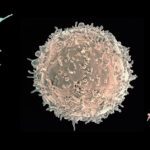Impaired type I interferon activity and inflammatory responses in severe COVID-19 patients
Jérôme Hadjadj, Nader Yatim, Laura Barnabei, Aurélien Corneau, Jeremy Boussier, Nikaïa Smith, Hélène Péré, Bruno Charbit, Vincent Bondet, Camille Chenevier-Gobeaux, Paul Breillat, Nicolas Carlier, Rémy Gauzit, Caroline Morbieu, Frédéric Pène, Nathalie Marin, Nicolas Roche, Tali-Anne Szwebel, Sarah H Merkling, Jean-Marc Treluyer, David Veyer, Luc Mouthon, Catherine Blanc, Pierre-Louis Tharaux, Flore Rozenberg, Alain Fischer, Darragh Duffy, Frédéric Rieux-Laucat, Solen Kernéis, Benjamin Terrier
Coronavirus disease 2019 (COVID-19) is characterized by distinct patterns of disease progression that suggest diverse host immune responses. We performed an integrated immune analysis on a cohort of 50 COVID-19 patients with various disease severity. A distinct phenotype was observed in severe and critical patients, consisting of a highly impaired interferon (IFN) type I response (characterized by no IFN-β and low IFN-α production and activity), which was associated with a persistent blood viral load and an exacerbated inflammatory response. Inflammation was partially driven by the transcriptional factor nuclear factor–κB and characterized by increased tumor necrosis factor–α and interleukin-6 production and signaling. These data suggest that type I IFN deficiency in the blood could be a hallmark of severe COVID-19 and provide a rationale for combined therapeutic approaches.


